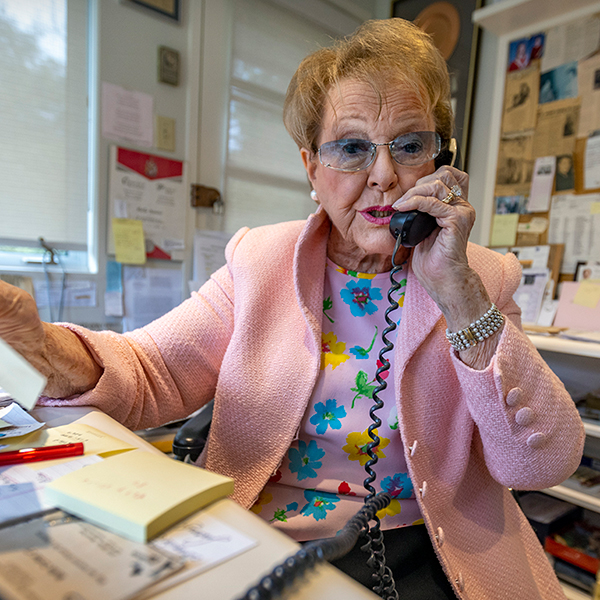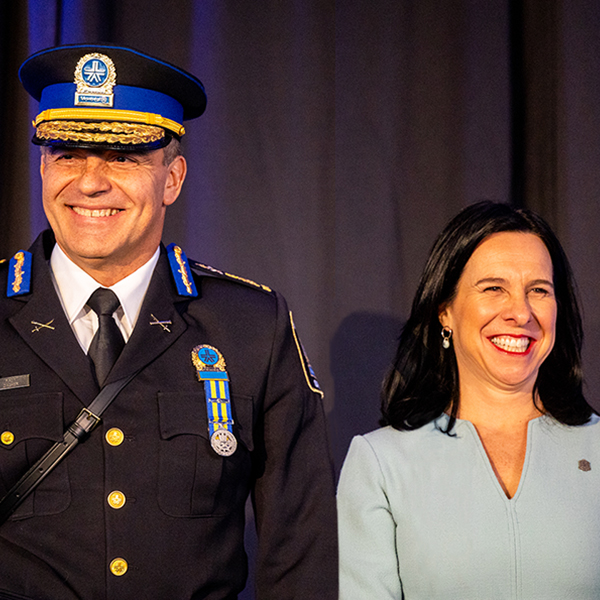When Chris Forbes, BA’89, MA’93, was named deputy minister of Agriculture and Agri-Food Canada (AAFC) in 2017, he inherited a full plate of federal policy initiatives affecting the $160-billion a year industry.
He had to defend Canada’s dairy sector, whose supply management regime was a target of the Trump administration in the NAFTA re-negotiation. His department also was in the midst of consultations with the Canadian public on a national food policy. And he had to advise the federal government on whether legalized marijuana production should qualify for AAFC subsidies.
During the renegotiation of the North American Free Trade Agreement, the access of U.S. farmers to Canada’s dairy and poultry sectors became a cause célèbre. The U.S. initially demanded that Canada dismantle its supply management regime, but eventually settled for a 3.5 per cent assured share of the Canadian dairy market.
Forbes was in almost daily contact with the chief agricultural negotiator on the Canadian trade team. He says he wasn’t surprised at the U.S. climb-down. “Canada made it clear that [dismantling supply management] was a no-go zone. The negotiations went through peaks and valleys, but as long as the U.S. stayed at the table, I felt that an alternative solution was feasible.”
Unlike his boss, Agriculture Minister Lawrence MacAulay, Forbes hasn’t been subjected to angry insults from protesting Canadian dairy farmers. “There’s a difference between the role of a public servant and the role of a politician,” he notes. “I meet fairly regularly with representatives of the national farm organizations and food-processor organizations. I’ve found the stakeholders to be passionate about the issues, but very professional.”
For the past two years, Forbes’s officials have been leading the consultations toward developing A Food Policy for Canada – a review intended to support ambitious agricultural growth targets while also addressing issues of food security, health and safety, and environmental sustainability.
The food policy review includes areas usually outside AAFC’s mandate such as food prices in the North and nutritional standards. AAFC has engaged the public through an online survey (which 40,000 completed), hearings in six cities and a two-day summit in Ottawa. Forbes says a policy document will emerge before the end of the Liberal government’s first term.
Meanwhile, the legalization of marijuana raised the question of federal subsidies for cannabis producers. While Health Canada licenses the cannabis growers, AAFC had to decide if they would be eligible for a share of the $2.7-billion in annual federal subsidies given to traditional crop growers.
AAFC support for sustainability and innovation is available, says Forbes, “but it’s unclear the cannabis folks fall into that category.” As for business risk management programs, cannabis is not included because of initial instability in prices. “It’s premature,” says Forbes. “We’ll revisit that in two years.”
The Toronto-born Forbes recalls his time on McGill’s downtown campus as life-changing. “The opportunity to study and socialize with people from the rest of the world expanded my horizons.” Courses with economics professors such as Chris Ragan and Bart Hamilton “put me on the path to where I am today.”
His career began in the economics department of the Toronto-Dominion Bank in 1993. For five years, he turned out economic analysis for both public papers and internal research used by lenders in assessing credit risk. “I enjoyed it immensely,” he says. But he aspired to work in policy development, so after five years he joined the Northwest Territories government in Yellowknife.
“Having spent all my life in big cities in southern Canada, it was a huge culture change to move to a town in the North,” he says. “Yellowknife was a great place to live.”
He arrived on the eve of the creation of Nunavut as a separate territory and negotiated with federal government officials on how Ottawa’s existing transfer payments to the NWT would be split between two territories. “Those negotiations built the connections with the federal finance department that led me to Ottawa,” he says.
In 2000, he joined finance, the first step in an 18-year career in the federal civil service. He has worked for 12 of those years at finance, in such areas as taxation policy, budget preparation, federal-provincial relations and social policy. He served stints as an assistant deputy minister and, briefly, as associate deputy minister of finance.
Despite not having an ag background, he served as associate deputy minister of AAFC in 2015-16 and returned there as deputy minister in May, 2017. “Sometimes it might be better to have personal experience in agriculture,” he says, “but I have a lot of strong colleagues who bring that to the table. My job is to set the table and let them be successful.”


